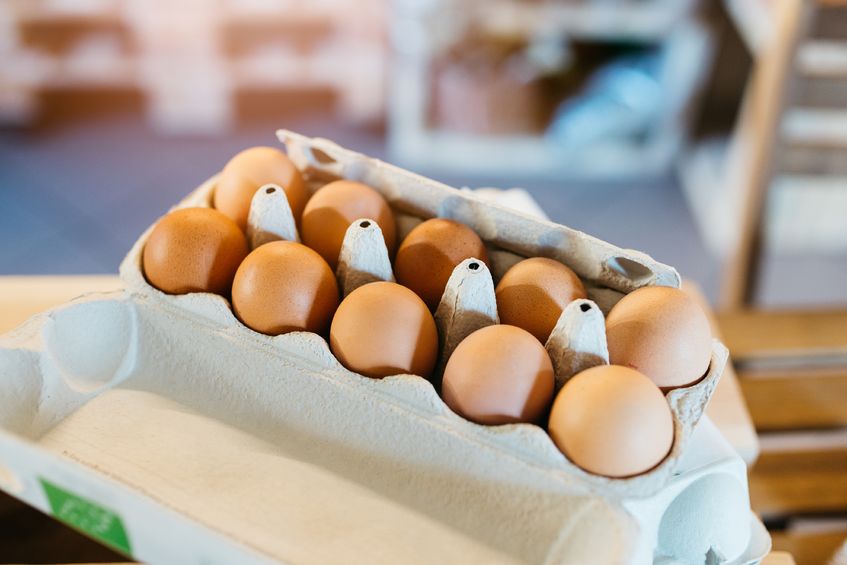
The trend towards flexitarianism is helping to drive growth in organic eggs, according to Soil Association.
It follows the publication of the Soil Association’s latest organic market report, which showed that the United Kingdom’s organic market overall was now worth £2.33 billion following growth in sales of 5.3 per cent in 2018.
Soil Association tade consultant Finn Cottle said that organic eggs enjoyed even greater growth last year – up 13 per cent by value – and she said that the move towards flexitarianism was helping drive this growth.
“We think organic shoppers are very motivated by health and are ahead of the game in managing their own diet,” said Finn.
“They are pre-disposed to making changes to their diet. I think that consumers' diets have started to change and they will continue to change - particularly with a new generation of consumers.”
She said that millennials were leading the flexitarian trend. “That trend will continue and there will be more opportunities for organic eggs as a substitute for meat.”
Finn said that organic eggs now accounted for eight per cent of the egg sector. “This is one of the highest penetration categories,” said Finn.
“The market is now worth approximately £70 million - now bigger in value than the organic table birds market. New customers are definitely coming into the category.
“The move to flexitarian diets and eating less meat, has had a significant impact on the growth for organic eggs. We believe that the diet conscious consumer, who is focused on health, is more inclined to choose organic.”
Recent research has provided more evidence of the trend towards meat and dairy alternatives. Research conducted by IGD revealed that more than half of British consumers were either following or were interested in a plant-based diet.
The trend was even more marked amongst younger people, with 68 per cent of 18-24-year-olds drawn to a vegan, vegetarian or flexitarian diet.
Vanessa Henry, shopper insight manager at IGD, said: “We are seeing an increasing number of people adopting a more flexible approach to their diets, whether it’s just for one meal or one day a week, shoppers are increasingly choosing a vegan, vegetarian or flexitarian diet.
“This is for a variety of reasons; the aspiration to be healthier, to adopt more ethical credentials and also to limit the impact on the environment. Some shoppers also claim it helps them reduce their overall food bill.”
There is a feeling that flexitarianism is helping to boost the egg category overall, not just organic eggs. The British Egg Industry Council (BEIC) said it thought increasing demand for eggs in 2018 was the result of consumer desire for healthier options, flexitarianism and the impact of the change in official advice that vulnerable groups could now enjoy runny eggs, as long as they were Lion.
Following more than ten years of sales growth, annual retail egg sales were up again in 2018, this time by around four per cent year-on-year by volume - the equivalent of 240 million extra eggs, or around half a pack of extra eggs for every person in the UK.
Value was also up by four per cent, which equates to around £36 million. The BEIC said sales also remained strong into the New Year period.
The most recent Defra figures show that 769,000 cases of organic eggs passed through UK packing stations in 2018 compared with 710,000 cases in the previous year – an increase of just over eight per cent. Supplies of eggs overall were up by 3.3 per cent to just under 31 million cases.
The Soil Association’s organic market report revealed that the overall organic market in the United Kingdom was now worth £2.33 billion. Growth of 5.3 per cent was well ahead of the non-organic market, it said.
The figure represented the highest ever value placed on the organic market, following seven consecutive years of growth, and meant that almost £45 million was spent on organic each week.
The Soil Association said that organic accounted for 1.5 per cent of the overall food and drink market in the United Kingdom and was expected to be worth as much as £2.5 billion by 2020.
Clare McDermott, business development director with Soil Association Certification, said: “Organic is in the right place to capitalise on many of the consumer trends we’re currently seeing across retail.
“We know that more shoppers are looking to purchase sustainable products to reduce their impact on the planet, and this has combined with an increasing value being placed on transparency and traceability in the food system, more local and online shopping, and increasing interest in healthy options – where organic is often seen as a signpost to healthy choice.
“Because organic is legally certified, shoppers can trust that the food they are buying has been produced with the utmost care for the environment, animals and land, as well as being fully traceable.
“Its encouraging that, despite uncertainties in the wider food and drink and non-foods sectors, more and more shoppers are turning to the organic symbol as one they can trust to deliver many of the assurances – environmental, nutritional and ethical – that they are looking for.”
The Soil Association said the increasing consumer demand for organic had resulted in more farmers going into organic farming. The latest statistics from Defra – covering 2017 – showed that the amount of organic certified land has increased by 1.9 per cent, the first rise since 2008.
Land in conversion also increased by nearly 30 per cent, a third consecutive year of growth, and Soil Association Certification expected this to continue, as, post-Brexit, consumer demand for products from UK producers and sustainable agro-ecological systems could rise.
